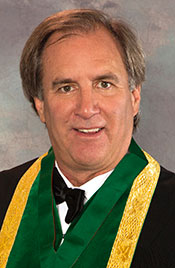 Dr. Leland McFadden
Dr. Leland McFadden
In the 5 years since I began serving on the executive council of The Royal College of Dentists of Canada (RCDC), I have witnessed extraordinary changes in the organization. I am reminded of a wonderful quote by Isaac Asimov: “It is change, continuing change, inevitable change, that is the dominant factor in society today. No sensible decision can be made any longer without taking into account not only the world as it is, but the world as it will be.”
I believe Asimov’s words ring true in today’s fast-paced business environment, where change is a certainty that demands organizational leaders plan effectively for the future by acting according to 3 guiding principles: an understanding of the environment, adaptability and vision. RCDC operations are continually affected by a plethora of factors—including political, economic, and technological influences—that frequently challenge RCDC to adhere to these principles.
Technology, in particular, has had a significant impact on the way RCDC conducts its core business. Changes in the way the National Dental Specialty Examination (NDSE) is administered illustrate how RCDC has been aggressive in developing and implementing strategic technologies in a changing environment. In response to comments we received from our NDSE candidates, the 6-hour written Component I Examination (CI) will be replaced with a web-based examination in 2014. The improved format will eliminate some of the challenges inherent in writing a 6-hour examination and significantly expand its reach. It is anticipated that by 2016, and perhaps as early as 2015, candidates will be able to take the CI from anywhere in the world—wherever there is internet access.
Another technological innovation is our newly developed Integrated NDSE Content Administration Platform (INCAP)—a set of interfaces RCDC designed to support content development, while reducing the need for costly face-to-face examination development workshops and administration of the NDSE. In addition, the implementation of real-time marking with integrated key validation is a significant improvement that will have long-term benefits and allow RCDC to increase the scope of its analytics.
Lastly, customer service software was implemented in response to RCDC’s greater reliance on technology and the IT-related issues that would inevitably arise. The software was necessary to ensure that RCDC staff and agents could respond to technical issues in a timely and professional manner through web forms, email, phone and chat rooms.
The truth is, organizations do not change—people do. When we stop looking for ways to improve and stubbornly resist change, our complacency makes it increasingly difficult to succeed. Adapting to an ever-changing landscape requires an environment that encourages team development and welcomes progress. At RCDC, cultivating this environment within our committees and staff allowed the College to embrace new concepts and new ways of doing things, paving the way for improvements, big and small.
Asimov’s belief in the constancy of change was accompanied by his view that “…our everyman must take on a science fictional way of thinking.” During my tenure as president, the College has broadened its horizons as we shifted to an environment of organizational growth and vitality by creating imaginative solutions firmly rooted in reality. As a result, I believe RCDC is well positioned for the future.
